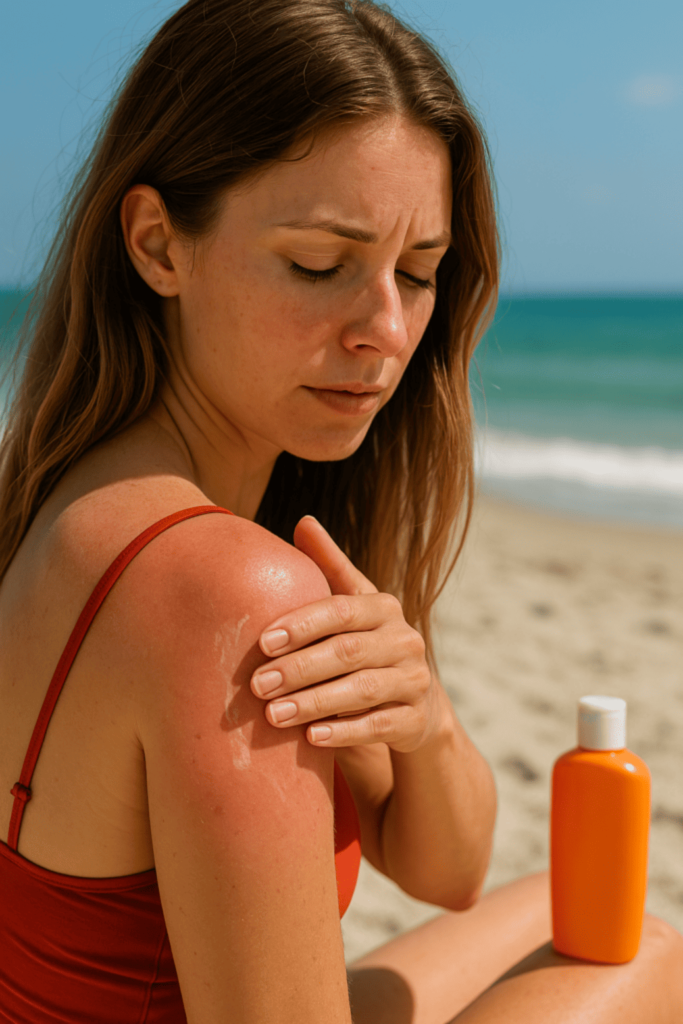
Introduction
Summer is a season associated with sunshine, vacations, and outdoor activities. However, the effects of heat on the human body are both positive and negative, making it essential to understand how rising temperatures impact physical and mental health. From increased vitamin D production to heat exhaustion and dehydration, the human body reacts in a variety of ways to hot weather.
This article explores both the beneficial and harmful consequences of summer heat on the body, supported by recent medical studies, scientific research, and reputable sources such as Wikipedia, the National Institutes of Health (NIH), and prominent medical journals. By examining the biological mechanisms triggered by heat, we aim to help readers make informed decisions to enjoy summer safely.

Positive Effects of Summer Heat on the Human Body
While high temperatures are often seen as dangerous, moderate sun and heat exposure can offer significant health benefits. Here are some of the key positive effects:
1. Boosts Vitamin D Production
Vitamin D, also known as the “sunshine vitamin”, is produced in the skin when exposed to ultraviolet B (UVB) rays. According to a 2023 study published in the Journal of Clinical Endocrinology & Metabolism, 15-20 minutes of sun exposure daily during summer months can help maintain healthy vitamin D levels, which are vital for:
- Strengthening bones and teeth
- Enhancing immune function
- Reducing the risk of depression, especially seasonal affective disorder (SAD)
📌 Key Point: Summer sun exposure can reduce vitamin D deficiency, which affects more than 1 billion people worldwide (NIH).
2. Promotes Sweating and Detoxification
Sweating is the body’s natural cooling mechanism, and it also plays a role in detoxification. Research by the Environmental Health Perspectives Journal (2022) indicates that sweating helps eliminate toxins, such as heavy metals and BPA, from the bloodstream. This natural purification process can improve:
- Skin clarity
- Kidney function
- Metabolic processes
📌 Key Point : Sweating in hot weather can contribute to detoxifying the body and promoting skin health.

3. Enhances Circulation and Cardiovascular Health
Exposure to heat causes vasodilation — the widening of blood vessels — which improves blood flow and helps reduce blood pressure in some individuals. A 2021 clinical study from the American Heart Association found that moderate heat exposure may improve vascular flexibility and heart function, particularly in people with mild hypertension.

Negative Effects of Summer Heat on the Human Body
Despite the benefits, excessive heat exposure can pose serious health threats. The risks are heightened for the elderly, infants, and people with chronic illnesses.
1. Risk of Heat Stroke and Heat Exhaustion
Heat stroke is a life-threatening condition where the body’s temperature regulation fails. It can lead to:
- Confusion
- Seizures
- Organ failure
According to the Centers for Disease Control and Prevention (CDC), over 600 people in the U.S. die annually from heat-related illnesses. Common symptoms include:
| Condition | Symptoms |
|---|---|
| Heat Exhaustion | Heavy sweating, fatigue, dizziness, nausea |
| Heat Stroke | Confusion, rapid heartbeat, no sweating, coma |
📌 Key Point : Prolonged exposure to high temperatures without hydration and cooling can cause serious heat-related illnesses.
2. Dehydration and Electrolyte Imbalance

High heat increases fluid loss through sweating, which can result in dehydration. This can disturb the balance of electrolytes (sodium, potassium, and magnesium) necessary for:
- Muscle function
- Nerve transmission
- Heart rhythm
A 2022 publication in the New England Journal of Medicine emphasized the need for regular fluid intake in summer, particularly for athletes and outdoor workers.
📌 Key Point: Dehydration can lead to fatigue, muscle cramps, and in severe cases, kidney damage or heart issues.
3. Sleep Disturbances
Elevated nighttime temperatures can disrupt the body’s ability to cool down, which is necessary for initiating deep sleep. The Sleep Research Society notes that heat reduces REM sleep and increases nighttime awakenings. Poor sleep quality can:
- Weaken the immune system
- Increase stress levels
- Impair cognitive performance
4. Skin Damage and Increased Cancer Risk
Extended exposure to ultraviolet (UV) radiation without protection can cause sunburn, photoaging, and increase the risk of skin cancer. According to the American Academy of Dermatology, more than 5 million cases of skin cancer are diagnosed each year in the United States, with UV exposure being the leading cause.
📌 Key Point : Using sunscreen, wearing protective clothing, and avoiding sun exposure during peak hours (10 a.m. to 4 p.m.) are essential preventive measures.

Scientific Chart : Effects of Heat on the Human Body
| Category | Positive Effects | Negative Effects |
|---|---|---|
| Skin | Vitamin D production, improved glow | Sunburn, premature aging, increased risk of skin cancer |
| Cardiovascular System | Improved circulation, reduced blood pressure | Heat stroke, high heart rate |
| Nervous System | Mood improvement, reduced depression symptoms | Fatigue, confusion, dizziness |
| Immune System | Enhanced by vitamin D | Weakened by dehydration and poor sleep |
| Muscular System | Better flexibility due to warmth | Muscle cramps from electrolyte imbalance |
| Sleep Cycle | Regulated melatonin in balanced heat | Disturbed sleep in high nighttime temperatures |
Preventive Measures to Stay Safe in Summer Heat
To enjoy the positive effects of heat while avoiding the negatives, follow these expert-recommended precautions:
- Hydrate Regularly – Drink at least 2-3 liters of water daily.
- Use Sunscreen – Apply SPF 30+ every 2 hours during sun exposure.
- Wear Light Clothing – Choose breathable fabrics like cotton or linen.
- Avoid Peak Sun Hours – Stay indoors between 10 a.m. and 4 p.m.
- Take Cool Showers – Regulates body temperature and improves sleep.
- Eat Hydrating Foods – Include fruits like watermelon, cucumber, and oranges.
Recent Medical Studies and References
- “Heat-Related Illness and Death: Prevention Guidelines” — CDC
- “Seasonal Variations in Vitamin D and Cardiovascular Risk” — Journal of Clinical Endocrinology & Metabolism, 2023
- “The Benefits of Sweating and Detoxification in Thermal Stress” — Environmental Health Perspectives, 2022
- “Dehydration and Electrolyte Disorders in the Heat” — New England Journal of Medicine, 2022
- “Skin Cancer and UV Exposure Trends” — American Academy of Dermatology (aad.org)
- Wikipedia entry on Heat stroke and Hyperthermia
Conclusion
Understanding the positive and negative effects of heat on the human body is essential for maintaining good health during the summer months. While the season brings benefits such as increased vitamin D, better circulation, and detoxification, it also carries health risks like heat stroke, dehydration, and skin damage.
By staying informed, applying protective measures, and listening to the body’s signals, it is possible to harness the health benefits of summer heat while avoiding its dangers. Always consult with healthcare providers during extreme weather, and take extra precautions for vulnerable groups like children and the elderly.
☀️ Summer can be a season of vitality or vulnerability — the choice is in how we respond to the heat.







